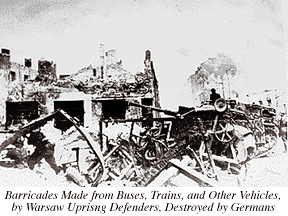
But troubling to the Polish partisans was that as the Soviets "liberated" eastern Poland, they left in their wake a pro-Communist civil authority, exemplified by the Lublin Committee in Lublin. Hoping to establish a non-Communist post-war government in Poland, the decision was made for the Polish Home Army to attack the Germans in Warsaw in advance of the Red Army, with the understanding that Soviet reinforcements would be available if needed. Indeed, the Red Army entered the Warsaw suburb of Praga, across the Vistula River, late in July, 1944.

During the sixty-three days of fighting the Red Army, encamped within sight across the Vistula, never attempted assistance. The Soviets refused permission to the Americans and British to use their airfields to drop ammunition and relief supplies. In September, when a German victory seemed certain, the Russians allowed a small amount of ammunition to be dropped in, but it was useless: it was made for Soviet armaments and did not fit the Poles' weapons.
When hostilities ceased, eighty-five percent of the city was razed, and the Polish Home Army annihilated . The Germans deported the remaining population. When the Germans were eventually defeated there were no forces left to oppose Soviet political domination in Poland.
The Rand McNally Encyclopedia of World War II, General Editor, John Keegan, Rand McNally, New York: 1977
The Simon and Schuster Encyclopedia of World War II, Edited by Thomas Parrish, Brig. Gen. S.L.A. Marshall, chief Consultant Editor, Simon and Schuster, New York: 1978
The Marshall Cavendish Illustrated Encyclopedia of World War II, Volume 13, Brigadier General Jame L.Collins,Jr., Consultant Editor, Marshall Cavendish Corporation, New York: 1972